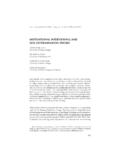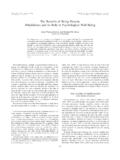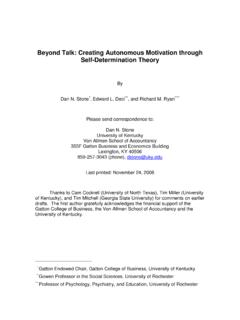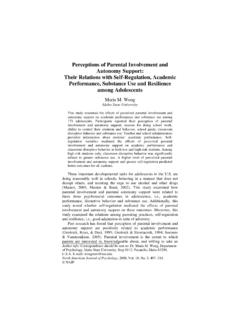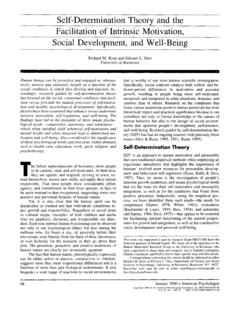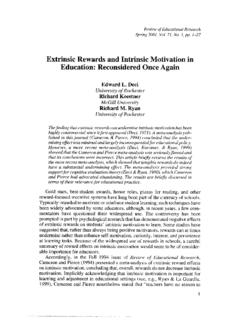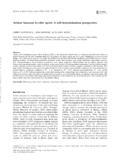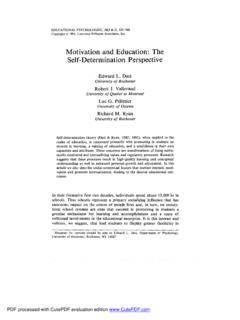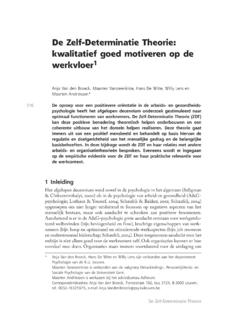Transcription of Self-Determination in a Work Organization
1 Journal of Applied Psychology Copyright 1989 by the American Psychological Association, Inc. 1989, Vol. 74, No. 4, 580-590 0021-9010/89/$ Self-Determination in a work Organization Edward L. Deci, James E Connell, and Richard M. Ryan University of Rochester Research testing Self-Determination theory was discussed in terms of recent work on intrinsic moti- vation, participative management, and leadership. On three occasions, managers' interpersonal ori- entations-toward supporting subordinates' Self-Determination versus controlling their behavior-- were related to perceptions, affects, and satisfactions of the subordinates.
2 Data from 23 managers and their subordinates in a major corporation showed that managers' orientations did correlate with the subordinate variables, although the magnitude of the relation varied, seemingly as a function of factors in the corporate climate. An organizational development intervention, focused on the concept of supporting subordinates' Self-Determination , was provided for the managers. Evaluation of the program showed a clearly positive impact on managers' orientations, though a less conclusive radia- tion to subordinates. To be self -determining means to experience a sense of choice in initiating and regulating one's own actions.
3 Recent research linking Self-Determination to, enhanced creativity (Amabile, 1983), conceptual learning (Benware & Deci, 1984), self -es- teem (Deci, Schwartz, Sheinman, & Ryan, 1981), and general well-being (Langer & Rodin, 1976) has stimulated psychologists to clarify the antecedent conditions that promote self -determi- nation and to detail the relevance of Self-Determination to vari- ous applied settings. Concepts related to Self-Determination have been vigorously researched and discussed in the organizational literature for over a quarter century. Argyris (1957) and McGregor (1960), for example, stressed that organizational contexts providing workers the opportunity to satisfy their higher order needs (Maslow, 1943) promote effective performance.
4 Furthermore, management styles ( , Likert, 1967; Marrow, Bowers, & Sea- shore, 1967) and organizational designs ( , Hackman & Old- ham, 1980; Herz~rg, 1966) that permit greater participation in decision making and greater flexibility in doing one's job have been found to be positively associated with employee satis- faction, quality of work life, and organizational effectiveness ( , Lawler, 1986), although these positive effects have emerged more clearly for some employees than for others (Hackman & Lawler, 1971). Our research tested Self-Determination theory (Deci & Ryan, 1985) by exploring the interpersonal work climate created by managers for their subordinates.
5 More specifically, it focused on the degree to which managers' interpersonal orientations tend to support subordinates' Self-Determination , that is, their sense This research was supported by a grant from the Xerox Corporation to the Human Motivation Program at the University of Rochester. We would like to thank John W. Robinson and Robert W. Mann, both of Xerox, for facilitating the project. In addition, we would like to thank Robert E. Driver, Christina M. Frederick, Wendy S. Grolnick, John S. Simonson, and Paul F. Tero for their help with various aspects of the research. Correspondence concerning this article should be addressed to Ed- ward L.
6 Deci, Human Motivation Program, Department of Psychology, University of Rochester, Rochester, New York 14627. of choice and personal initiative. The idea of managers' sup- porting Self-Determination is conceptually and philosophically consistent with participative management and vertical job en- largement, although it differs from them by focusing on the in- terpersonal orientation of managers rather than on the decision- making process or the job design. The variables in the organizational literature that are perhaps closest to that of a manager's support for Self-Determination have been systematized in Bowers and Seashore's (1966) theory of leadership.
7 These authors defined the management function of support as managers' behaviors that enhance subordinates' feelings of personal worth, and they aligned this concept to Hal- pin and Winer's (1957) idea of consideration and Likert's ( 1961 ) principle of supportive relationships. Our concept of supporting Self-Determination is also related to Bowers and Seashore's idea of support, although it extends their idea by specifying the fac- tors that are likely to lead to subordinates' feelings of personal worth. These factors, which comprise the concept of managers' support for Self-Determination , have emerged from recent moti- vation research; thus, elaboration of the point requires a brief review of that motivation research.
8 Motivation Research In a recent literature review, Deci and Ryan (1985) argued ~ that the functional significance ( , the psychological meaning) of any input affecting the initiation and regulation of inten- tional behavior can be usefully classified as eitlier informational ( , as supporting autonomy and proroodng competence) or controlling ( , as pressuring one to think, feel, or behave in specified ways). Experiencing an input as informational fosters Self-Determination , whereas experiencing it as controlling di- minishes Self-Determination . Early studies on the contextual factors that affect self -deter- mination were laboratory experiments involving external ma- nipulations from which inferences could be drawn about whether specific events ( , reward structures, deadlines, or positive feedback) tend to be experienced as informational ( , as supporting Self-Determination ) or controlling ( , as thwart- ing Self-Determination ).
9 These studies indicated, for example, \ 580 Self-Determination AT work 581 that choice (Zuckerman, Porac, Lathin, Smith, & Deci, 1978) and positive feedback (Blanck, Reis, & Jackson, 1984; Deci, 1971) tend to be experienced as informational, whereas task- contingent rewards ( , Ryan, Mims, & Koestner, 1983), dead- lines (Amabile, DeJong, & Lopper, 1976), threats of punish- ment (Deci & Cascio, 1972), surveillance (Lepper & Greene, 1975), and evaluations (Smith, 1974) tend to be experienced as controlling. More recent studies have shown, however, that although a specific event ( , positive feedback) tends, on average, to have a particular functional significance, the interpersonal context within which the event is administered has an important influ- ence on the functional significance of the event.
10 Thus, for exam- ple, Ryan (1982) reported that positive feedback could be expe- rienced as either informational or controlling, depending on the experimenter's style of communication. Similarly, Ryan, Mims, and Koestner (1983) concluded that performance-contingent rewards could be either informational or controlling, and Koestner, Ryan, Bernieri, and Holt (1984) concluded that limit setting could be either informational or controlling, again de- pending on the interpersonal contexts surrounding the events themselves. A focus on the interpersonal context within which events oc- cur seems particularly important when applying these concepts to organizational settings, because many events such as reward structures, evaluations, and deadlines are relatively invariant in these settings.
